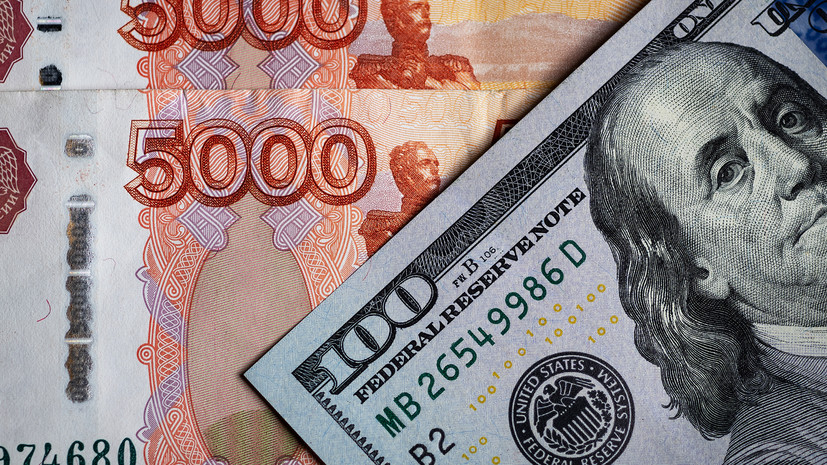On Monday, October 10, the Russian currency weakens on the Moscow Exchange.
At the beginning of trading, the dollar rose by 3.4% and for the first time since July 7 reached 63.1 rubles.
At the same time, the euro exchange rate grew to 61.7 rubles.
“The national currency was under pressure from a new round of geopolitical crisis.
Investors were alerted by the escalation of the conflict in Ukraine, and this is reflected in the stock market as a whole, which also sank today.
The fact is that against the background of the geopolitical factor, sanctions risks are also increasing, ”Sergey Suverov, investment strategist at Arikacapital, explained to RT.
According to the Ministry of Defense of the Russian Federation, on the morning of October 10, the Russian armed forces inflicted a massive strike on energy, military command and communications facilities in Ukraine.
According to Russian President Vladimir Putin, this step was a response from Moscow after a series of terrorist attacks by the Kyiv regime.
In particular, we are talking about the sabotage that took place on October 8 on the Crimean bridge.
In response to the actions of the Russian side, Europe may increase sanctions pressure on Moscow, which was announced on Monday by the representative of the EU foreign service, Peter Stano.
However, according to him, at present the European Union "has nothing to announce," writes RIA Novosti.
In the near future, the Russian currency may still remain under some pressure, Vladimir Bragin, director for the analysis of financial markets and macroeconomics at Alfa Capital, did not rule out.
Nevertheless, as the expert stressed, the determining factor for the ruble will still be the imbalance of supply and demand in the country's foreign exchange market.
It should be noted that for several months, dollars and euros received from exports continue to flow into Russia in significant volumes.
At the same time, business demand for these currencies is still low, as imports have not yet recovered to pre-crisis levels.
Against this background, according to the latest estimates of the Central Bank, from January to August 2022, the surplus of the current account of Russia's balance of payments reached $183.1 billion. This is three times more than in the same period of 2021.
“Indicators of the current account remain extremely favorable for the ruble.
Therefore, there are no fundamental reasons for a strong and sustainable weakening of the Russian currency now,” Vladimir Bragin emphasized.
Moreover, in recent days, the ruble has been supported by the growth of world oil prices, Sergey Suverov noted.
So, since the beginning of October, raw materials of the reference Brent brand on the ICE exchange in London have risen in price by about 10% and are now trading near $97 per barrel.
According to Suverov, the actions of the countries participating in the OPEC+ deal had a positive impact on the price of oil.
On October 5, the alliance, contrary to US demands, decided to reduce energy production by a total of 2 million barrels per day.
In this regard, the cost of a barrel of Brent in the foreseeable future will tend to the psychological level of $100, analysts say.
AP
© Lisa Leutner
As Artyom Deev, head of the analytical department at AMarkets, suggested in an interview with RT, within a few days the dollar and euro rates could return to the 60 ruble mark.
However, by the end of the year, the figures will gradually rise to the range of 68-70 rubles, the specialist believes.
“The government has repeatedly stated the need to return to the exchange rate near 70 rubles per dollar.
Foreign exchange interventions of the Ministry of Finance can contribute to this.
Back in September, the department was going to start buying currency on the market in connection with the adoption of a new budget rule, but this has not yet happened.
The start of operations will be the main factor for the weakening of the ruble, but the process will not be fast and landslide, but gradual,” Deev said.
In addition, market participants will continue to closely monitor the sanctions rhetoric of the West, Sergey Suverov believes.
As the expert recalled, at the beginning of the month, investors were afraid of the introduction of restrictions on the National Clearing Center (NCC).
The organization acts as an intermediary in foreign exchange transactions on the stock exchange.
Restrictions against NCC would make exchange trading in dollars and euros impossible in Russia.
However, the corresponding measures were not included in the eighth package of EU sanctions.
“The risk of introducing such restrictions still remains.
Banks and the Central Bank have already begun to prepare for such a scenario and are working out options on how to set the course in the event of sanctions against the NCC.
However, if these restrictions are nevertheless introduced, the ruble may even get stronger on this factor, ”Suverov suggested.

